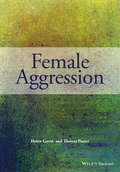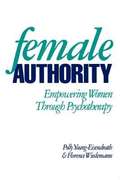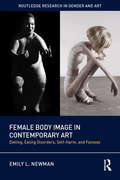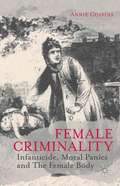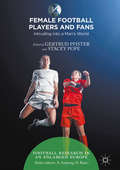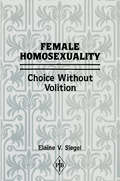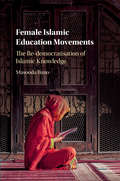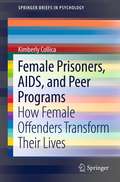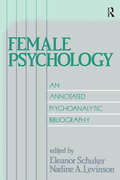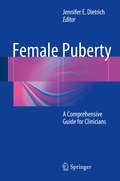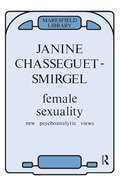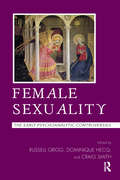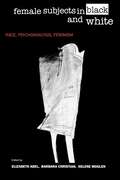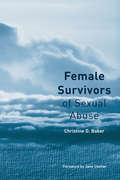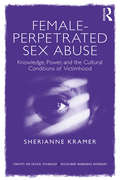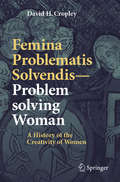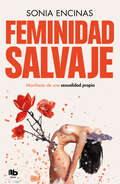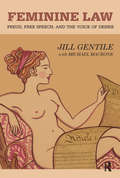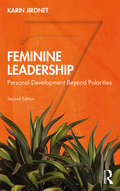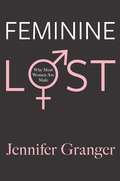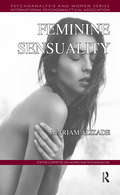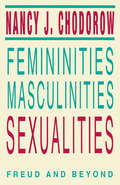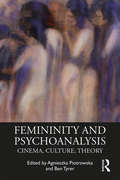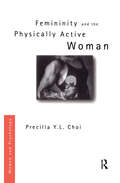- Table View
- List View
Female Aggression
by Helen Gavin Theresa PorterThis critique explodes the stereotypical assumption that men are more prone than women to aggressionA cogent and holistic assessment of the theoretical positions and research concerning female aggressionExamines the treatment, punishment and community response to female aggressive behaviorExamines topics including sexual power, serial murder and the evolution of gendered aggressionTreats female aggression in its own right rather than as a counterpart to male violence
Female Authority: Empowering Women through Psychotherapy
by Polly Young-Eisendrath Florence L. WiedemannFor women in Western society, there is no straightforward path of development to autonomous adulthood. The double-bind of female authority--that a women cannot be both a healthy adult and an ideal woman-- is the context in which a woman must construct her self in this culture. Whether she sees herself as "too needy" or "too controlling," "too insecure" or "too self-reliant," she is gathering evidence to support a theory of personal inadequacy. The traditional perspectives of psychodynamics and psychopathology reinforce women's sense of inferiority. How then does a woman claim her own authority-- the validity of her own truth, beauty, goodness, originating in her own experience. Young-Eisendrath and Wiedemann break with the tradition of "deficit thinking," the examination of what is absent, wrong, or deficient. Recognizing this as a fundamental barrier to the empowerment of women, they work instead from an understanding of what is already strong and satisfying in the lives of women and girls in a patriarchal society. This volume unravels the paradox of female authority through the examination of its sociocultural, symbolic, and personal dimensions. Chapters 1 through 4 present a re-visioning of the female self, using the psychologies of C. G. Jung and Jane Loevinger as major theoretical frameworks. The authors argue for a modification of Jung's concept of "animus'' --the repressed masculine in the girl or woman--and in chapters 5 through 8 present a detailed model of psychotherapy based on five stages of animus development. Using a wealth of clinical material from their own practices --including two extended case presentations in chapters 9 through 11-- the authors skillfully illustrate their own efforts to help women assume greater personal authority. The book's concluding chapter presents New Texts and Contexts for Female Development. Unique in its combination of feminist theory, social psychology, and Jungian psychology, FEMALE AUTHORITY offers a fresh approach to the analysis of gender concerns in identity. The book will be of great value to practitioners and theoreticians in the human services. The discussion of women's self-esteem and personal authority, and the probing of conflicts inherent in female identity in our society, place this book among the major recent contributions to the development of a psychology of women.
Female Body Image in Contemporary Art: Dieting, Eating Disorders, Self-Harm, and Fatness (Routledge Research in Gender and Art)
by Emily L. NewmanNumerous contemporary artists, particularly female artists, have chosen to examine the idealization of the female body. In this crucial book, Emily L. Newman focuses on a number of key themes including obesity, anorexia, bulimia, dieting, self-harm, and female body image. Many artists utilize their own bodies in their work, and in the act of trying to critique the diet industry, they also often become complicit, as they strive to lose weight themselves. Making art and engaging eating disorder communities (in real life and online) often work to perpetuate the illnesses of themselves or others. A core group of artists has worked to show bodies that are outside the norm, paralleling the rise of fat activism in the 1990s and 2000s. Interwoven throughout this inclusive study are related interdisciplinary concerns including sociology, popular culture, and feminism.
Female Criminality
by Annie CossinsThis is the first book to consider the moral regulation of the female body through an analysis of the crime of infanticide. An in-depth perspective from the nineteenth century to the present, Cossins provides a revealing insight into the history of a little-known but widespread social crime.
Female Football Players and Fans
by Gertrud Pfister Stacey PopeThis volume draws upon social science and historical approaches to provide insights into the world of women’s football and female fans. It gives an in-depth analysis of the development of the women’s game in different European countries and examines the experiences of female fans. An overview about women’s football in Europe shows the rise and development of the game and the increasing inclusion of girls and women in football and fan communities. To date, there has been a lack of research on female participation in football, but drawing on research studies from various European countries, the volume explores a range of issues, including how girls and women become football fans and players, how women combine football with their everyday lives, and how they may encounter stereotypes and barriers when they challenge male dominance by entering this traditionally male sport. This collection will be of interest to students and scholars in a range of fields, including sports sociology, sport sciences, gender studies, leisure studies, women’s studies as well as fandom and cultural studies.
Female Homosexuality: Choice Without Volition (Psychoanalytic Inquiry Book Series)
by Elaine V. SiegelDescribing in detail her analytic treatment of eight female homosexuals with common symptoms of incomplete body image and unconscious denial of differences between the sexes, Siegel details the recurring treatment phases that typified their analyses and offers formulations based on both ego-developmental and object-relational perspectives. She candidly describes the countertransferential issues that entered into the treatment of these women and examines basic societal assumptions about sexuality that are imprinted on the analyst.
Female Islamic Education Movements: The Re-democratisation of Islamic Knowledge
by Masooda BanoSince the 1970s, movements aimed at giving Muslim women access to the serious study of Islamic texts have emerged across the world. In this book, Masooda Bano argues that the creative spirit that marked the rise and consolidation of Islam, whereby Islam inspired serious intellectual engagement to create optimal societal institutions, can be found within these education movements. Drawing on rich ethnographic material from Pakistan, northern Nigeria and Syria, Bano questions the restricted notion of agency associated with these movements, exploring the educational networks which have attracted educated, professional and culturally progressive Muslim women to textual study, thus helping to reverse the most damaging legacy of colonial rule in Muslim societies: the isolation of modern and Islamic knowledge. With its comparative approach, this will appeal to those studying and researching the role of women across Africa, the Middle East and South Asia, as well as the wider Muslim world.
Female Life Careers: A Pattern Approach (Routledge Library Editions: Women and Work)
by David Magnusson Sigrid B. GustafsonOriginally published in 1991, this volume represents the first systematic attempt to apply a pattern approach to a comprehensive longitudinal investigation. It focuses on individual differences in female career development, from early adolescence through young adulthood. Rather than constructing a general model of career development, the authors use the interplay between theory and observation to build networks of patterns demonstrating the long-term consequences for adult women's career involvement, their educational levels, their family commitments, and their social networks.Throughout their investigation the authors interpret individuals' patterns as characterizing processes that underlie women's differential development. They illustrate that a research strategy oriented toward pattern analysis and related methodology reveals information that is generally obscured in more traditional variable-oriented designs. They also argue that a pattern approach is particularly suited to the tenets of modern interactionism, which provides the theoretical foundation of the study.
Female Prisoners, AIDS, and Peer Programs
by Kimberly CollicaThis book highlights a neglected area in the field of rehabilitation of female offenders with AIDS. It provides data to show how women, working as HIV peer educators in prison, utilize their peer experiences as a transition point for rehabilitation both inside and outside of the penitentiary. HIV and prison are inextricably linked and education has proved to be the one constant that mitigates the spread of both HIV and crime. Research on female inmates in general is not frequent and this book presents unique qualitative data that includes rich accounts from the women themselves. It illustrates the benefits derived by female inmates who work in an HIV prison-based peer program, while adding to the criminology literature on female patterns of criminality and rehabilitation. It provides a greater understanding of how prison programs affect the processes of criminal desistance and behavioral changes for female inmates. Women involved in such programming are able to change the criminal trajectory of their life direction. contributing to reduced levels of recidivism and institutional disciplinary infractions. The implications for these programs is relevant within the broader perspective of women, HIV and incarceration.
Female Psychology: An Annotated Psychoanalytic Bibliography
by Eleanor Schuker; Nadine A. LevinsonThis book provides a psychoanalytic perspective on female psychology and includes articles with divergent theoretical viewpoints. It is useful for both research and clinical study and may also provide a bridge to scholars, teachers, and clinicians outside of psychoanalysis itself.
Female Puberty
by Jennifer E. DietrichFemale Puberty: A Comprehensive Guide for Clinicians is a practical reference, covering the full range of issues related to pubertal development. Developed to answer pointed clinical questions and to provide a thorough review of the literature, the book covers both the basics and the complexities of puberty, encompassing psychosocial development to pubertal nuances in highly specialized populations. Comprehensive in scope, this title offers concepts that are concisely conveyed and chapters that complement each other well. Complex subjects such as details of the hypothalamic-pituitary-ovarian axis are covered in a readily understandable manner and bullet points throughout the text serve as helpful reminders to the reader. An invaluable contribution to the literature, Female Puberty: A Comprehensive Guide for Clinicians will be of great interest to all health providers concerned with female reproductive health - including obstetrician gynecologists, reproductive endocrine specialists, pediatricians, pediatric specialists, family practitioners and allied health professionals.
Female Sexuality: New Psychoanalytic Views
by Janine Chasseguet-SmirgelThis book examines the theories of female sexuality, using the Freudian and non-Freudian approach to the unconscious. It emphasise on what in the psychoanalytic image of man matters most. The book helps fill a long-apparent need for authoritative analyses in feminine psychology and sexual identity.
Female Sexuality: The Early Psychoanalytic Controversies
by Russell Grigg"Undoubtedly, ‘Contributions to the Masculinity Complex in Women,’ is an underrated paper. This may be due to its not being published in English until 1924, well after Freud introduced the term ‘masculinity complex’ into his own writings. However, Van Ophuijsen’s paper was originally presented to the Dutch Psycho-Analytical Society much earlier, on 23rd June 1917. It was published in German the same year and in Dutch the following year. The term ‘masculinity complex’ is in fact van Ophugsen’s invention and Freud acknowledges his debt in his 1919 paper, ‘A Child is Being Beaten’. It is also in the present paper that various manifestations and possible consequences of penis envy are first clearly expressed, just as the libidinal investment in the ‘virile’ erogenous zone is linked to the attachment to the mother. This last point is particularly important, and Freud will later appeal to it in explaining the phallicism of the little girl. The material van Ophuijsen draws on derives from five case studies of obsessional women. One of the cases, who is here simply referred to as H., is subsequently discussed by Jeanne Lampl de Groot in her 1928 paper, ‘Evolution of the Oedipus Complex in Women’, a discussion Freud alludes to in his ‘Female Sexuality’ of 1931. The analysand was referred to Lampl de Groot because of difficulties encountered in the transference to a male analyst. It is also worth noting that van Ophuijsen takes her to be an obsessional, while Lampl de Groot diagnoses hysteria. Van Ophuijsen’s starting point concerns one aspect of the theory of penis envy; namely, that it derives from the sense a woman has of having been injured in infancy through no fault of her own and hence she will blame her mother for having brought her into this world as a woman instead of a man. This matches some character types encountered in analysis, van Ophuijsen conjectures. He also points out that this turning against the mother is, as with the castration complex, founded on a belief in the possibility of possessing the penis. The difference between the castration and masculinity complexes is that the sense of guilt attached to the former is absent from the masculinity complex, in which, on the other hand, what predominate are the sense of having been wronged and accompanying bitterness and reproaches. Moreover, the term is intended to connote the presence of a form of rivalry with men rather than the presence of any overt masculine characteristics. Finally, one should note the connection between the masculinity complex and the urethral erotism which van Ophuijsen explains in terms of a regression to the auto-erotic stage later tackled by other analysts such as Karen Homey."
Female Subjects in Black and White: Race, Psychoanalysis, Feminism
by Barbara Christian Elizabeth Abel Helene MoglenThis landmark collaboration between African American and white feminists goes to the heart of problems that have troubled feminist thinking for decades. Putting the racial dynamics of feminist interpretation center stage, these essays question such issues as the primacy of sexual difference, the universal nature of psychoanalytic categories, and the role of race in the formation of identity. They offer new ways of approaching African American texts and reframe our thinking about the contexts, discourses, and traditions of the American cultural landscape. Calling for the racialization of whiteness and claiming that psychoanalytic theory should make room for competing discourses of spirituality and diasporic consciousness, these essays give shape to the many stubborn incompatibilities—as well as the transformative possibilities—between white feminist and African American cultural formations.Bringing into conversation a range of psychoanalytic, feminist, and African-derived spiritual perspectives, these essays enact an inclusive politics of reading. Often explosive and always provocative, Female Subjects in Black and White models a new cross-racial feminism.
Female Survivors of Sexual Abuse
by Christine D. BakerHow can we treat survivors of sexual abuse more effectively?Sexual abuse against females is a serious problem in society and there is a need for a greater understanding of the presentation and treatment of adult survivors of sexual abuse. In Female Survivors of Sexual Abuse, Christine Baker combines her clinical experience with an innovative approach to the treatment of this problem.Female Survivors of Sexual Abuse addresses the experience of 180 female adults who were sexually abused in childhood, and provides detailed analyses and treatment approaches. The subject matter is presented in an accessible and compassionate way, imparting personal opinion and experience. It covers:* female survivors: their stories, and the evidence* integration, the alliance and the therapist* the survivor's journey to recovery* the families, disclosure and the role of the mother.This book enables the reader to "enter" the experience of the survivors and follow their progress to recovery, while highlighting the ever-changing state of knowledge in this difficult area. It will be invaluable to practitioners and students of clinical psychology, counselling, and psychiatry.
Female-Perpetrated Sex Abuse: Knowledge, Power, and the Cultural Conditions of Victimhood (Concepts for Critical Psychology)
by Sherianne KramerFemale-Perpetrated Sex Abuse is a groundbreaking study into gender, sexuality and victimhood. It examines the cultural conditions of possibility for FSA victimhood as a means to advance contemporary critical understandings of the role of gender and sexuality as instruments of modern power. As the first direct exploration of FSA victimhood, this book analyses: why victims of FSA remain so underexplored and invisible as objects of human science knowledge; the limited and overly rigid discourses in local and global psychological theory and practice that continues to treat particular subjects as ‘victim worthy’ through paradigms that construct victimhood as gendered; and the possibility of new discourses that could disrupt normative understandings of gender, sexuality, and power in sex abuse, and as constitutive to the beginnings of a counter-knowledge on transgressive sexualities. By tracing the historical and cultural conditions of the emergence of FSA broadly and FSA victimhood specifically, Kramer illustrates how deeply engrained constructions of gender and sexuality both produce and constrain the possibilities for reporting, disclosing and self-identifying victimhood. Female-Perpetrated Sex Abuse is essential reading for academics, researchers and students alike, in the areas of psychology, sociology, gender studies, criminology, counselling and social work.
Femina Problematis Solvendis—Problem solving Woman: A History of the Creativity of Women
by David H. CropleyThis book explores the history of modern human creativity/innovation, highlighting examples of solutions to basic human’ needs that have been developed over time. The title – Femina Problematis Solvendis – is a play on the scientific classifications of humans (Homo habilis, Homo erectus, Homo sapiens), but with special focus on inventions pioneered by women (“femina”) and is intended to suggest that a defining characteristic of modern humans is our fundamental ability to solve problems (i.e., problem-solving woman = Femina problematis solvendis), Written by David H. Cropley, an internationally recognised expert on creativity and innovation, it also builds on his previous book “Homo Problematis Solvendis –Problem-solving Man”, published in 2019. The book explores innovations over ten distinct “ages” of human history, beginning with “prehistory”, and moving up to the present “information age”. Each era is covered by a dedicated chapter that describes three key innovations that were either definitely invented by a woman or can be plausibly attributed to a female inventor. The book’s focus on female inventors also serves to highlight some of the ways women have been treated in societies over time.
Feminidad salvaje: Manifiesto de una sexualidad propia
by Sonia Encinas¿Te has preguntado por qué vives la sexualidad como lo haces? ¿Qué significa para ti gozar? Con Feminidad salvaje, la sexóloga Sonia Encinas nos invita a abrir una caja de Pandora que lleva demasiado tiempo enterrada y a unirnos a una revolución que no necesita ni pancartas ni barricadas. Esta tiene lugar en lo más íntimo, en nuestra propia cama, en nuestro propio cuerpo, en nuestros propios ritmos sexuales y en la definición propia de la feminidad. Se trata de una sublevación ante lo que nos dijeron que debíamos ser y de una transformación que nos conecta con nuestra esencia más salvaje, aquello que no podemos (ni debemos) domar. Un camino hacia la mujer sexual que somos. Para recuperarnos, liberarnos y gozar. Sonia Encinas, con su gran habilidad para comunicar, se desnuda ante la lectora y, a través de su propia historia –a la vez tan personaly universal–, la guía para reconectar consigo misma, con su cuerpo, con sus emociones y creencias, para redescubrir sin pudor su propia sexualidad. Un libro que habla sobre el sexo, el amor, las relaciones, el respeto, los cuidados, la sororidad y el feminismo. «Mujer salvaje, que el placer sea tu brújula».
Feminine Law: Freud, Free Speech, and the Voice of Desire
by Jill Gentile Michael MacroneFeminine Law: Freud, Free Speech, and the Voice of Desire explores the conjunction between psychoanalysis and democracy, in particular their shared commitments to free speech. In the process, it demonstrates how lawful constraints enable an embodied space or "gap" for the potentially disruptive but also liberating and novel flow of desire and its symbols. This space, intuited by the First Amendment as it is by Freud's free association, enables personal and collective sovereignty. By naming a "feminine law," we mark the primacy a space between the conceivable and the inconceivable, between knowledge and mystery. What do political free speech and psychoanalytic free association have in common, besides the word "free"? And what do Sigmund Freud and Justice Louis Brandeis share besides a world between two great wars? How is the female body a neglected key to understanding the conditions and contradictions of free discourse? Drs. Jill Gentile and Michael Macrone take up these questions, and more, in their wide-ranging, often passionate exploration of the hidden legacy of Freud and the Founding Fathers.
Feminine Leadership: Personal Development Beyond Polarities
by Karin JironetIn this revised and updated edition, Feminine Leadership: Personal Development Beyond Polarities illustrates how contemporary leaders may seek to renew the very notion of leadership through their own personal development. In an accessible and engaging style, Karin Jironet demonstrates the process of personal transformation using Dante’s seven sins and virtues, explains the value of psychology and spirituality for leadership roles, and presents a pioneering and refreshed vision of leadership that meets present global demands for social cohesion and sustainability. Containing updates throughout, Jironet presents personal narratives that illustrate the seven virtues of leadership practice in our current socio-political context, addressing questions on how leadership is defined, exercised and communicated in contemporary society. Feminine Leadership will be of great interest to all leaders and professionals who wish to familiarize themselves with personal leadership development and learn how Jungian theory has been put into practice in this field. The first edition of this book was nominated for the New York Gradiva Award.
Feminine Lost: Why Most Women are Male
by Jennifer GrangerFeminine Lost explores the premise that all human beings are constructed of two energies, one masculine and one feminine. With the rise of the feminist movement, many women have migrated to their masculine side, some to the extent of losing access to their feminine side altogether. As a consequence, men have found their way to their feminine side. This process has had huge consequences for relationships between men and women, often leaving them feeling unsatisfied within their relationships or lonely without one. Feminine Lost examines female archetypes - the Andro Woman, the Cougar, the Good Doer, and more - that have come to the fore since the feminist movement, pairing them with their masculine opposite, and looking at how the process of attraction functions under these circumstances. When the feminine principle breaks down, the ramifications are many. Feminine Lost breaks through the misunderstanding of what it means to be feminine; it is not an outward appearance but something far more significant.
Feminine Sensuality (Psychoanalysis and Women Series)
by Alcira Mariam AlizadeThis book provides an overview of the events of intimacy, a chronicle of the erogenous events that occur in a woman's body. It discusses the concept of psychoanalysis keeping very close to the body—a body that feels, vibrates, and is repressed, a body that depends on its fellow beings.
Femininities, Masculinities, Sexualities: Freud and Beyond (Blazer Lectures)
by Nancy J. ChodorowThe author of The Reproduction of Mothering examines the problems with how psychoanalysis views sexuality and gender.Nancy J. Chodorow takes her fellow psychoanalysts to task for their monolithic and pathologizing accounts of deviant gender and sexuality. Drawing from her own clinical experience, the work of Freud, and a close reading of psychoanalytic texts, Chodorow argues that psychoanalysis has yet to disentangle male dominance from heterosexuality. Further, she demonstrates the paucity of psychoanalytic understanding of heterosexuality and the problematic polarizing of normal and abnormal sexualities. By returning to Freud and interpreting psychoanalysis through clinical eyes, Chodorow contends that psychoanalysis must consider individual specificity and personal, cultural, and social factors. Such a methodology entails a plurality of femininities and masculinities and enables us to understand a variety of sexualities.Praise for Femininities, Masculinities, Sexualities“Raises challenging questions but makes no easy answers.” —Psychoanalytic Quarterly“[Chodorow’s] convincing analysis leads us to wonder whether it is any longer useful to think in terms of a normative boy and girl, man and woman, father and mother, and heterosexual and homosexual.” —Sally Moskowitz“Chodorow helps us through the dense riches of Freud’s writing, signposting his scattered but significant moments of empathy with women’s subjective experience even as she takes apart his objectified, masculine images.” —The Women’s Review of Books“A provocative reminder that these are complex issues and that humans, with their capacity for individual variation, are complicated subjects.” —Kirkus Reviews
Femininity and Psychoanalysis: Cinema, Culture, Theory
by Ben Tyrer Agnieszka PiotrowskaFor Freud, famously, the feminine was a dark continent, or a riddle without an answer. This understanding concerns man’s relationship to the question of ‘woman’ but femininity is also a matter of sexuality and gender and therefore of identity and experience. Drawing together leading academics, including film and literary scholars, clinicians and artists from diverse backgrounds, Femininity and Psychoanalysis: Cinema, Culture, Theory speaks to the continued relevance of psychoanalytic understanding in a social and political landscape where ideas of gender and sexuality are undergoing profound changes. This transdisciplinary collection crosses boundaries between clinical and psychological discourse and arts and humanities fields to approach the topic of femininity from a variety of psychoanalytic perspectives. From object relations, to Lacan, to queer theory, the essays here revisit and rethink the debates over what the feminine might be. The volume presents a major new work by leading feminist film scholar, Elizabeth Cowie, in which she presents a first intervention on the topic of film and the feminine for over 20 years, as well as a key essay by the prominent artist and psychoanalyst, Bracha Ettinger. Written by an international selection of contributors, this collection is an indispensable tool for film and literary scholars engaged with psychoanalysts and anybody interested in different approaches to the question of the feminine.
Femininity and the Physically Active Woman (Women And Psychology Ser.)
by Precilla Y. ChoiThe fitness boom of the last two decades has led to many people incorporating exercise into their lifestyles through activities such as jogging and aerobics. However, whilst many physical and psychological health benefits have been documented, far too few people actually take part in enough exercise to glean significant improvements, and this is much more a problem for women than men.Femininity and the Physically Active Woman explores one reason many women offer for their lack of involvement in sport and exercise - that they are not the 'sporty' type. Precilla Y.L. Choi argues that the 'sporty' type is masculine, and to determine how this notion might affect women's self-perceptions, she critically examines the experiences of women athletes, bodybuilders, recreational exercisers and girls' physical education. What emerges is the importance of visible differences between women and men, in terms of muscularity, strength and agility in order to maintain the gender order. Thus, if a girl or woman wishes to play the masculine game of sport she must do so in conformity with a number of patriarchal rules which ensure she is first and foremost recognised as a heterosexual feminine being.Contributing to a psychology of the physically active woman by examining women's experiences from critical feminist and gendered perspectives, Femininity and the Physically Active Woman will be of great interest to students, researchers, practitioners and teachers from a range of disciplines.Precilla Y.L. Choi is the British Association for the Advancement of Science's Joseph Lister Lecturer for 2000. She has co-edited, with Paula Nicolson, Female Sexuality (Prentice Hall).
